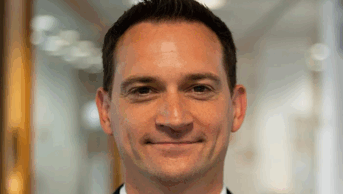Interview
What will elected technicians bring to the reformed Council’s deliberations? |
|
Lesley Morgan has had a long and varied career involving most sectors of the pharmacy profession. And this, she believes, is something that will help her in her role as one of two technicians elected to the Royal Pharmaceutical Society’s reformed Council. The new Council will begin its official business next week and in the current climate of change, both within the profession and within the Society, there will be plenty of issues to debate over the next few years. Mrs Morgan’s current role is as assistant director of the Welsh Centre for Postgraduate Pharmaceutical Education. It is no surprise, therefore, that education and training is one of the issues that is high on her agenda. She is also an executive committee member of the Association of Pharmacy Technicians UK (APTUK), an organisation of which she has been a member since 1979, serving as its president, treasurer, chairman, secretary and education officer. When she first joined, the association was lobbying hard to get technicians registered. “The officers strove for their aims and some of that rubbed off,” she says. “Joining APTUK was a good way for me to understand what was going on at a national level,” she adds. When she first joined APTUK, Mrs Morgan had recently returned to work as a hospital pharmacy technician after an 11-year career break. This extended absence from the profession necessitated retraining and it was at this point that she noticed the lack of post-qualification training opportunities for technicians. “A lot of the pharmacists I worked alongside in hospital used to go to study evenings … and I got incensed that there was nothing for technicians,” she says. She decided to set herself a mission: before she retired, there would be some sort of structured training for pharmacy technicians in Wales. And with the support of pharmacists in Wales she has achieved this, securing funding from the then Welsh Office to look at training and education of technicians across Wales. Well qualifiedShe went on to gain various management and training qualifications, including a master’s in education. In 1989, she became a member of the Society’s first working party on education and training of certified support staff, and she currently sits on the Society’s support staff regulation steering group. In 1998 she was awarded an MBE for her services to pharmaceutical education in Wales. When the opportunity to stand for Council came Mrs Morgan could not let it pass her by. “I have got this ethos that I can’t expect other people to do things that I wouldn’t do,” she explains. She recognised that it was an opportunity that had to be taken. “I am passionate about technicians and the role they play in the pharmacy profession,” she says. She explains why she believes it is important for technicians to be represented on the Council now that they are going to be registered with the Society. “If the Council is going to be making rules about how technicians work and about our code of ethics then it is important that we have the opportunity to put forward the implications of any changes for that group of staff,” she says. She adds that having people from a variety of backgrounds, who will look at things from different perspectives, will broaden the debate on all issues that the Council discusses. Important issuesThe issues that are important to Mrs Morgan stem from her interest in education and training, and standards of practice. Her prime concern is that training should be of a nationally high standard. “The underpinning knowledge for baseline entry to the register of technicians needs a robust quality assurance system to ensure standardisation across Great Britain,” she says. She explains that technicians need to obtain Scottish/National Vocational Qualification Level 3 Pharmacy Services in order to register with the Society, and this requires proof of underpinning knowledge and work-based experience. It has not yet been decided how the quality of underpinning knowledge programmes can be monitored, she says. Another burning issue is that of the Section 60 Order. “One of our first jobs on Council will be to consider the consultation on the Section 60 Order, and that is something we need to get right,” she says. She also believes it is important that the Government and the general public should have a greater understanding of the impact of pharmacy on the health agenda. Future role of techniciansMrs Morgan would like to see community pharmacy technicians’ careers developing in a similar way to those of hospital technicians. “I think there are opportunities in the new contract but there are issues that need to be clarified,” she says, specifically, whether pharmacists can delegate certain tasks to technicians. “The new contract seems to be saying ‘Pharmacists can provide this service or that service’ but it is not clear what roles can be delegated in delivering that service,” she says. For example, she believes that technicians in the community could play a role in medicines use reviews in the same way that technicians in hospitals are involved in medicines management. Although she acknowledges that technicians do not possess the clinical skills to carry out medicines use reviews independently, she believes they are well equipped to gather information from patients about their medicines and identify issues with compliance. This information could then be passed on to the pharmacist. “It would entail a sort of triage system. This would save pharmacists’ time because they would already have the baseline data to start thinking about the clinical issues,” she suggests. It all comes down to better use of skill mix, she says. She adds that, as with S/NVQ 3, a national standard is needed to ensure that technicians are supported by appropriate training to carry out these extended roles. Anticipation …Mrs Morgan is looking forward to being able to contribute to the future direction of the profession through her role on the Council. “I want to be able to influence policy in a constructive way and to move pharmacy forward. If I feel that I have done that, then it will be worthwhile,” she says. She concludes: “It is all very exciting and new. I think it is a really good milestone both for technicians and for pharmacists.” |



